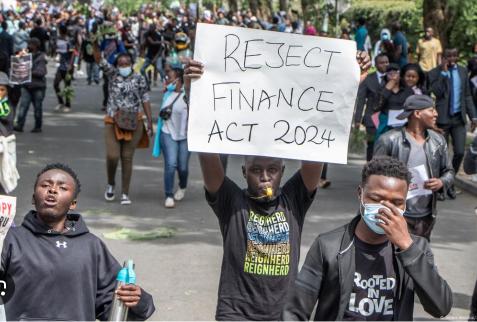Gen Z protests trigger treasury to cut Sh52bn in Government spending

National Treasury data shows spending fell from Sh751.25 billion to Sh699.30 billion, marking the first such decline since Covid.
Following the collapse of the Finance Bill 2024 in the face of strong youth-led protests, the government slashed Sh51.95 billion in day-to-day spending by March in an effort to manage a massive budget deficit without relying solely on debt.
National Treasury data shows that operations and maintenance costs for national government departments dropped to Sh699.30 billion, down from Sh751.25 billion recorded during the same nine-month period last year.
The 6.91 percent reduction is the first drop in this category over a comparable period since the Covid-19 outbreak four years ago. The decline is directly linked to enforced expenditure cuts that followed the failed attempt to raise Sh344.3 billion in new taxes through the Finance Bill 2024.
The plan to increase taxes faced fierce public opposition, especially from Gen Z protestors, who criticised the push amid rising living costs and stagnant wages. With the population rejecting the tax increase, the government was forced to reverse course and trim non-essential expenditures instead.
“What we ended up with was more like a 50-50 [situation] where we had to take more debt and reduce expenditure by almost Sh170 billion. This is a space where most government institutions had never been because... they did not get what they wanted,” said Treasury Principal Secretary Chris Kiptoo.
The Treasury revealed that about 27.44 percent of the Sh699.30 billion in operations and maintenance costs was funded through appropriations-in-aid. These are revenues collected from essential services offered by government such as issuance of passports, driving licences, title deeds, as well as birth and death certificates.
This marks a reversal from the previous year when the government had increased such spending by 22.49 percent to a record Sh751.25 billion. At the time, the administration focused on expanding taxes rather than reducing spending, citing little room for cuts.
However, after public pushback forced the withdrawal of the Finance Act, the government introduced aggressive spending restrictions. Budgets were eliminated for refurbishing and partitioning government offices, and new car purchases — except for security agencies — were suspended. Funding for travel, hospitality, and renovations was halved.
The acquisition of government vehicles, some costing over Sh30 million, was frozen for the first six months of the fiscal year. In addition, the number of government advisers was halved, and the mandatory retirement of public servants aged 60 was enforced. President Ruto’s administration also eliminated budgets for the offices of the first and second ladies, and scrapped confidential budgets for State House and all other public offices.
These measures were designed to contain the fiscal pressure left by the aborted Finance Act, limit borrowing, and realign government operations within the constrained financial environment created by the rejection of the proposed tax reforms.
